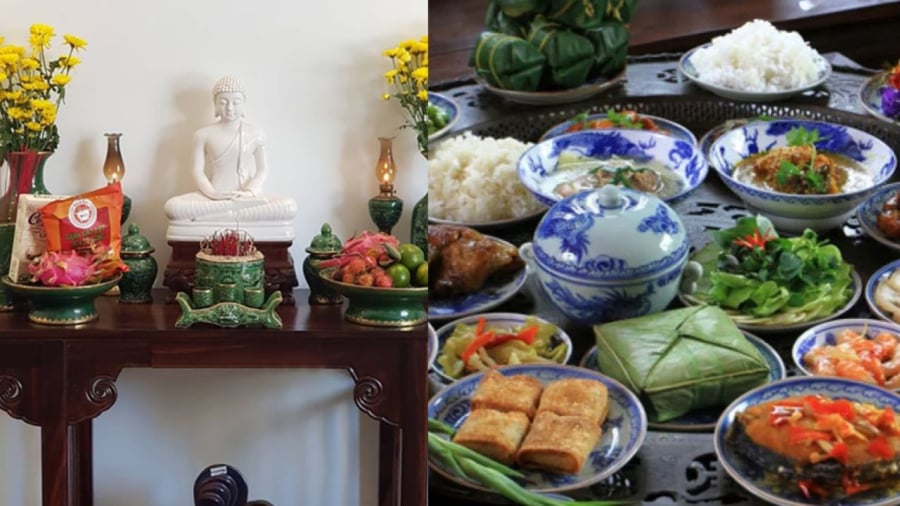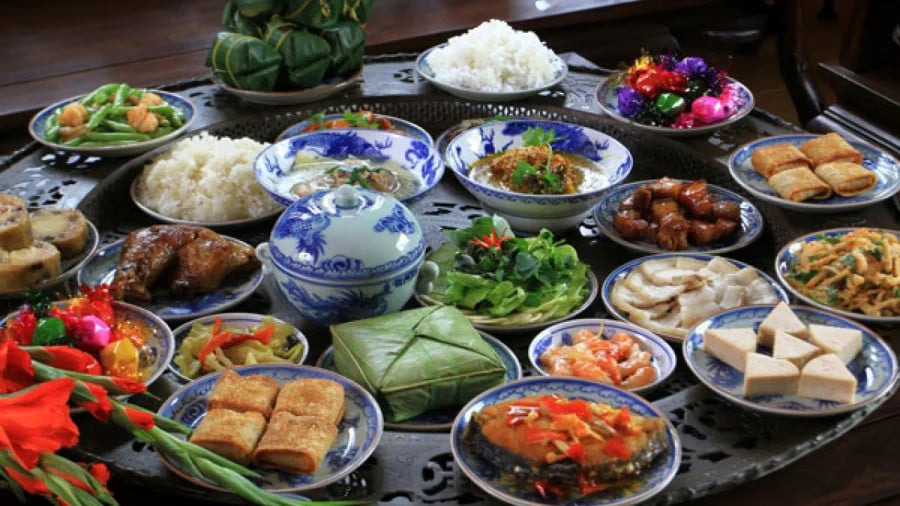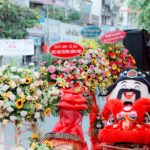When presenting offerings, we usually offer odd numbers 1-3-5-7-9 and rarely use even numbers. However, when it comes to the altar or ceremonial meals, even numbers 4-6-8 are used. So what is the significance of odd and even numbers, and when to use odd or even numbers?
The significance of arranging offerings with odd and even numbers
When lighting incense, we usually light odd numbers 1-3-5. When offering fruits, we arrange the flowers and fruits in odd numbers – 1-3-5 branches, 1-3-5 types of fruits on one plate. The water offered on the altar is also odd numbers – 3-5 cups or 1 cup, the number of water bottles, beer cans, quail egg wine bottles, betel leaves, tea bags, cigarette packs/boxes are also odd numbers. However, flower vases, candle holders, lanterns, and necklaces are used in pairs, and for ceremonial meals, the plates and dishes are arranged in even numbers 4-6-8.

According to feng shui beliefs, odd and even numbers have different meanings. Even numbers symbolize yin (negative), while odd numbers represent yang (positive) and growth. When using odd numbers, they represent positive energies and the desire for growth and prosperity. Therefore, we need to offer offerings in odd numbers 1-3-5-7-9 and avoid even numbers because even numbers are associated with the deceased. For example, offering 2 incense sticks is only done when visiting the deceased.
However, some decorative items on the altar use pairs due to their symmetrical nature, such as pairs of cranes, pairs of lanterns, and pairs of vases. In this case, the number 2 does not represent yin and yang but represents a pair or symmetry.
When preparing ceremonial meals to invite ancestors, it shows prosperity, neatness, and the wish for abundance. Therefore, when arranging the meal, we use even numbers 4-6-8 with the following meanings:
– 4 plates and 4 dishes symbolize the four realms, the four seasons, representing the minimum number of dishes. When offering or hosting a feast, there should be at least 4 plates and 4 dishes.
– 6 plates and 6 dishes and 8 plates and 8 dishes because the numbers 6 and 8 symbolize wealth and prosperity. When having a meal, preparing a feast shows completeness. When entertaining guests, it shows generosity and wealth. When offering ceremonial meals to ancestors, it signifies the wish for abundance and prosperity. Therefore, traditional ceremonial meals must have enough dishes like that. Wealthy families who are meticulous, have time, and are extravagant may offer 8 plates and 8 dishes to ancestors or when inviting guests.
Therefore, when arranging ceremonial items, pay attention to the significance of using odd and even numbers to comply with feng shui and customs.
Nowadays, the arrangement of ceremonial meals has changed, not always strictly adhering to 4-6-8 plates and dishes.

What if odd and even numbers are not guaranteed?
Arranging the number of ceremonial items such as fruits, incense, betel nuts, etc., people follow the habit of using odd numbers, so most people do not use even numbers. As for arranging the number of plates and dishes in a ceremonial meal, many households have flexibly followed the number of dishes cooked by the host rather than strictly adhering to the number of plates and dishes as in traditional ceremonial meals.
According to feng shui beliefs, adhering to the rule of odd and even numbers brings good luck and shows respect in ancestor worship. However, some people believe in sincerity, so they do not pursue complexity.
Therefore, depending on the family and beliefs, you can perform it accordingly.
This information is for reference only.
2023 Lunar New Year Gift Ideas for Older Family and Friends
As 2021 approaches, families worldwide are gathering to celebrate the special bond between grandparents and their grandchildren. To show their love and admiration, these thoughtfully chosen gifts will bring a smile to the face of the elderly. Here, we have compiled a list of the 13 most meaningful Tet presents that can bring joy to our beloved grandparents.






































